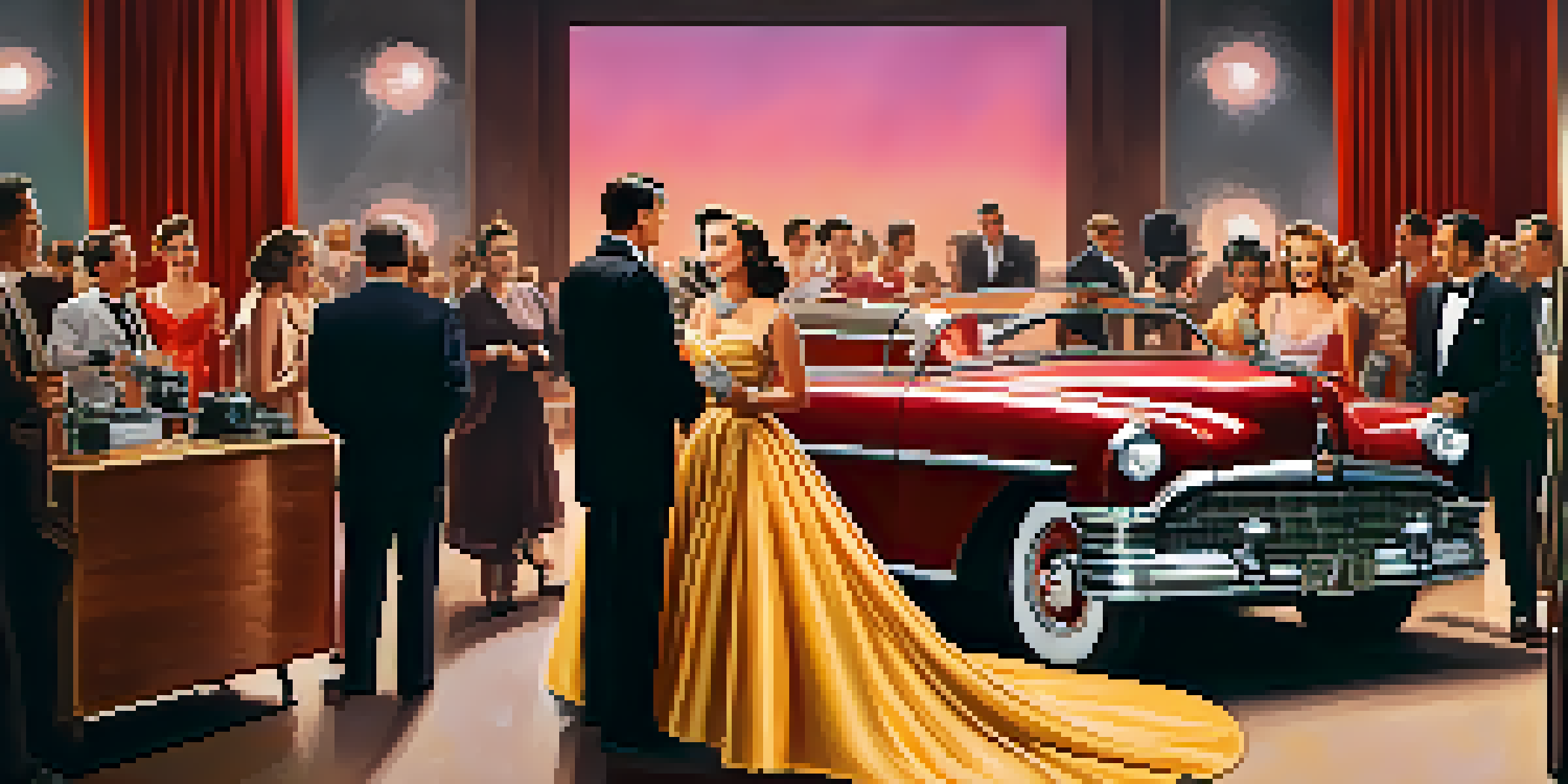From Silver Screen to Small Screen: A Hollywood Journey

The Evolution of Entertainment: Film to TV
The entertainment landscape has dramatically changed over the decades. Once dominated by glamorous Hollywood films, the rise of television has reshaped how audiences consume stories. Today, it's common for movie stars to transition to television, a shift that reflects both industry trends and audience preferences.
Television is a medium of entertainment which permits millions of people to listen to the same joke at the same time, and yet remain lonesome.
As streaming platforms gain popularity, we see a blending of cinematic quality in TV shows. Many series now boast production values that rival big-budget films, attracting top-tier talent. This evolution has made television a viable medium for actors seeking new opportunities and creative outlets.
Moreover, the storytelling possibilities in television have expanded, allowing for longer narratives and character development. This shift encourages actors to explore diverse roles, leading to a richer viewing experience for audiences. The line between the silver screen and the small screen is blurrier than ever.
Hollywood Icons Making the Leap
Many renowned actors have made the leap from film to television, showcasing their versatility. For instance, stars like Matthew McConaughey and Nicole Kidman have headlined acclaimed series, proving that television can be just as prestigious as film. Their transitions often bring a fresh perspective to their characters, captivating audiences in new ways.

This trend is not limited to dramatic roles; comedic actors like Steve Carell have also found success on the small screen. Their ability to switch genres demonstrates the talent and adaptability within Hollywood. These transitions highlight the changing perception of television, which is no longer seen as a lesser platform.
TV Stars Transitioning from Film
Many renowned actors are successfully shifting from film to television, showcasing the medium's prestige and expanding storytelling opportunities.
The allure of long-term character arcs and the chance to work with innovative storytellers draw many actors to television. With the rise of limited series and original content, Hollywood icons are embracing the small screen to showcase their skills in exciting new narratives.
Impact of Streaming Services on Hollywood
The advent of streaming services has revolutionized the entertainment industry. Platforms like Netflix, Hulu, and Amazon Prime Video have created an insatiable demand for quality content. This has opened doors for filmmakers and actors to explore television in ways that were previously unimaginable.
The great thing about television is that it allows you to be a part of people's lives without them even knowing it.
Streaming services have not only changed how we watch shows but have also influenced the types of stories being told. They encourage creativity and risk-taking, often producing content that may not have fit traditional broadcast formats. This new environment allows actors and creators to push boundaries and experiment with unique narratives.
Additionally, the global reach of streaming platforms allows stories from diverse cultures to be shared widely. This diversity enriches the television landscape and offers actors opportunities to engage with audiences around the world, elevating the medium as a whole.
The Rise of Limited Series and Anthologies
Limited series and anthology formats have gained immense popularity in recent years. These concise narratives allow for deep storytelling without the commitment of multiple seasons. Many actors find this format appealing, as it provides a chance to take on substantial roles without a long-term contract.
Shows like 'Big Little Lies' and 'The Queen's Gambit' have not only garnered critical acclaim but have also attracted A-list talent. These series often feature high production values and compelling storylines, making them a draw for both actors and viewers. The success of limited series has proven that great stories can thrive in shorter formats.
Impact of Streaming on Content
Streaming services have revolutionized the entertainment landscape, creating a demand for diverse and high-quality content that encourages innovative storytelling.
Anthologies, such as 'American Horror Story,' provide actors with the opportunity to reinvent themselves with each season. This flexibility allows them to tackle diverse genres and characters. As a result, limited series are becoming a preferred choice for many Hollywood stars looking to diversify their portfolios.
Challenges Faced by Actors Transitioning to TV
While the transition from film to television can be rewarding, it also comes with its challenges. For some actors, adjusting to the pace of television production can be daunting. Unlike films, which often have longer shooting schedules, TV shows require a quick turnaround, demanding adaptability and resilience.
Additionally, the typecasting that can occur in Hollywood may hinder an actor’s ability to land diverse roles on television. Once a star is known for a particular character, it can be difficult to break free from that mold. This challenge makes it essential for actors to carefully choose projects that showcase their range.
Moreover, the intense competition for roles in popular series adds another layer of difficulty. As more actors seek opportunities in television, landing a coveted role can be a challenge. Despite these obstacles, many actors embrace the journey, knowing that television can provide fulfilling and dynamic career paths.
The Cultural Impact of TV Stars
Television stars often hold significant cultural influence, shaping trends and conversations. As they step into homes across the world, their portrayals can resonate deeply with audiences, creating connections that sometimes surpass those of film stars. This accessibility can make TV actors powerful voices in social and cultural issues.
For instance, shows that tackle relevant societal themes can spark discussions and inspire viewers to reflect on their own lives. Actors often use their platforms to advocate for change, raising awareness on important topics. Their visibility in television allows them to reach diverse audiences and drive meaningful conversations.
Rise of Limited Series Formats
The popularity of limited series and anthologies allows actors to explore substantial roles without long-term commitments, making this format increasingly appealing.
Additionally, the fandom surrounding TV shows can create a sense of community among viewers. Fans often feel a personal connection to the characters and stories, which can enhance the cultural impact of the show. This unique relationship between TV stars and their audiences is a testament to the medium's power.
Looking Ahead: The Future of Hollywood and TV
As the lines between film and television continue to blur, the future looks bright for both industries. Innovations in technology and storytelling are paving the way for new formats and experiences. We can expect to see even more film stars taking on prominent roles in television, further solidifying its status as a respected medium.
Moreover, as audiences become more discerning, the demand for high-quality content will only increase. This pushes creators and actors to continue evolving, ensuring that storytelling remains fresh and engaging. The landscape will likely foster collaborations that bring together the best of both worlds.

Ultimately, the journey from the silver screen to the small screen reflects the changing dynamics of entertainment. With each passing year, we can anticipate exciting developments that challenge conventions and invite diverse voices into the conversation, enriching the viewing experience for everyone.